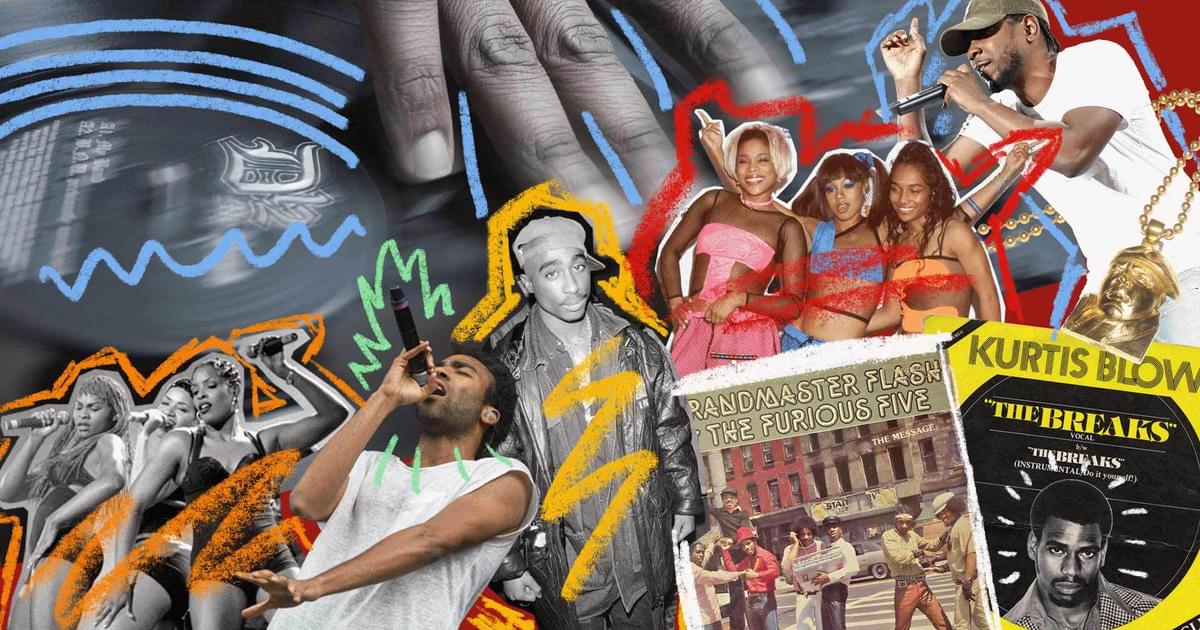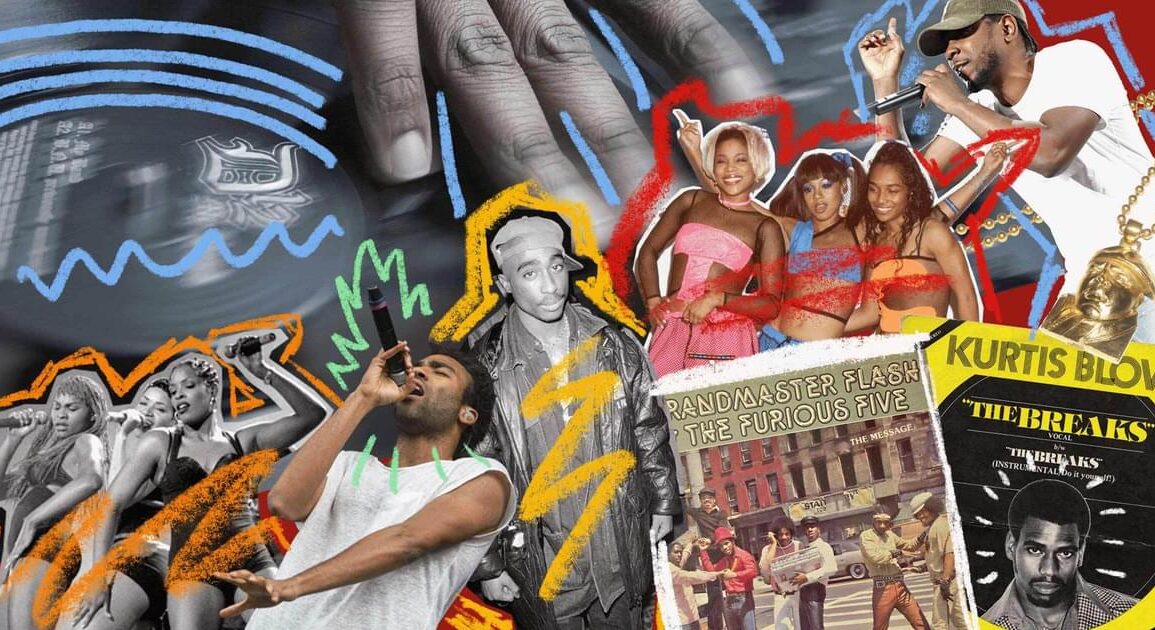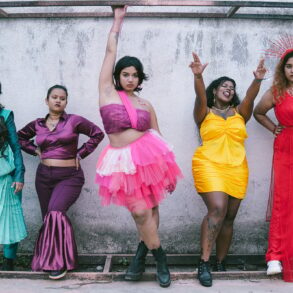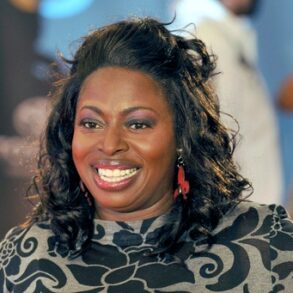
Fifty years ago this month, guests at a back-to-school party in a low-ceilinged rec room in the Bronx were treated to something groundbreaking: A young man named Clive Campbell had figured out a way to loop a single section of a record on two turntables so that it repeated continuously, letting the crowd dance and shout to the music for as long as they wanted.
That party is widely considered the birth of hip-hop, and Campbell, better known as DJ Kool Herc, its father. Across the country, artists and fans have been celebrating the genre’s 50th year, including with a weeklong celebration at New York City’s Lincoln Center.
“It’s an exciting time to think about how hip-hop itself, as its own genre within this larger organism of Black music, has evolved and is continuing to evolve,” said Stephanie Shonekan, dean of the College of Arts and Humanities and professor of ethnomusicology whose work focuses on Black musical traditions. “It’s honed itself depending on what region it’s in, what year it is, what’s happening in the United States.”
In honor of hip-hop’s golden anniversary, Shonekan shared with Maryland Today some of the songs that reflect contemporary American history.
Sermons
by C.L. Franklin / Richard Pryor / ”The Revolution Will Not Be Televised,” by Gil Scott-Heron
Hip-hop didn’t spring fully formed from DJ Kool Herc’s turntables in 1973. “Hip-hop continues from R&B, which has continued from soul, which has continued from the blues,” said Shonekan.
Strong percussion has been a signature of African American musical traditions since Africans carried the drumming practices of their native countries with them on slave ships, and the oral traditions of rhyming, wordplay and preaching from the Black church also lent themselves to hip-hop. The Rev. C.L. Franklin, father of Aretha Franklin, was a renowned Baptist minister whose sermons had a cadence and musicality reminiscent of rap songs. (In fact, his sermons have been sampled in songs like “Preacher Man” by Green Velvet.)
The pacing and imagistic language in standup comedian Richard Pryor’s routines also sound familiar to hip-hop fans. And in 1971, musician/poet/singer Gil Scott-Heron released “The Revolution Will Not Be Televised,” a song that combined a jazz melody with spoken lyrics that mocked the banality of popular culture in the face of the need for radical social change.
“The Message,” by Grandmaster Flash and the Furious Five / ”The Breaks,” by Kurtis Blow
DJ Grandmaster Flash and the rappers of the Furious Five tell the story of “what is happening in the streets” in New York City during the 1980s on “The Message,” said Shonekan. With its descriptions of “broken glass everywhere / People pissing on the stairs, you know they just don’t care,” the 1982 single painted a vivid portrait of life in the outer boroughs, where young Black people were floundering amid the onset of the crack epidemic and increasing gentrification. “The Breaks,” by Kurtis Blow, offers a similar perspective. “He’s saying, ‘We are losing our employment, we don’t have education, we are really struggling,’” said Shonekan.
[Cover Stories: ARHU Dean’s Podcast Debates Musical Remakes]
“Let’s Talk About Sex,” by Salt-n-Pepa / “Waterfalls,” by TLC
As HIV/AIDS continued to sicken and kill people—especially gay men—across the United States, the rap-and-DJ trio Salt-n-Pepa took a frank approach to the issue of safe sex with their 1990 single, “Let’s Talk About Sex”: “And like a dumb son of a gun, he forgot the condoms / ‘Oh well,’ you say, ‘What the hell, it’s chill / I won’t get got, I’m on the pill’ / Until the sores start to puff and spore / He gave it to you, and now it’s yours.”
Another female trio, TLC, also took on the topic of sexual health in its 1994 hit, “Waterfalls,” telling the story of a young man who, after a sexual encounter, “doesn’t recognize his own face / His health is fading and he doesn’t know why / Three letters took him to his final resting place.” TLC rapper Lisa “Left Eye” Lopes also frequently wore a condom as an eye patch to promote safe sex. Both groups “were explicit about how HIV and safe sex was an important part of what we should be paying attention to,” said Shonekan.
“Changes,” by Tupac Shakur / “Juicy,” by the Notorious B.I.G.
In 1998’s “Changes,” California rapper Tupac Shakur turned his attention to the war on drugs, high rates of incarceration among Black men, drug use, police violence and other contemporary issues. “Tupac is really saying, ‘Look, we need change,’” said Shonekan. “It reminds me a little bit of Sam Cooke and ‘A Change Is Gonna Come.’” Four years earlier, Shakur’s primary counterpart in the much-hyped East Coast/West Coast rap feud, the Notorious B.I.G., released his debut single “Juicy,” an ode to his younger self and the rap dreams he’d fulfilled. “The boasting is really a reflection of hope and aspiration against all odds in a society that doesn’t expect a guy like him to succeed,” said Shonekan. “These two artists are really introspective about what their experiences have been and what needs to happen.”
“Alright,” by Kendrick Lamar / “Black Rage,” by Lauryn Hill / “This Is America,” by Childish Gambino
“In the 2000s, we start to see the video evidence of what has been happening (regarding police violence) all these years,” said Shonekan. Released almost a year after the killing of Michael Brown in Ferguson, Mo., and just months after the deaths of Freddie Gray in Baltimore and Walter Scott in South Carolina, “Alright” became an anthem of sorts for the Black Lives Matter movement. In the chorus of the 2015 track, Kendrick Lamar asserts that although police “wanna kill us dead in the street … we gon’ be alright.” Singer and rapper Lauryn Hill was also inspired by Brown’s death to drop a previously unreleased song called “Black Rage,” whose lyrics refer to the police dog attacks and beatings of Black people during the civil rights movement. In 2018, Childish Gambino released “This Is America,” whose lyrics and video both depicted the repercussions of systemic racism.
“Self-Destruction,” by the Stop the Violence Movement / “Don’t Shoot,” by the Game ft. Rick Ross, 2 Chainz, Diddy, Fabolous, Wale, DJ Khaled, Swizz Beatz
These two songs, separated by 25 years, offer a point/counterpoint on the issue of gun violence, said Shonekan. After a fan was killed at a 1988 concert, rapper KRS-One formed a conglomerate of artists under the name the Stop the Violence Movement (including Chuck D, MC Lyte, Heavy D and Doug E. Fresh) and released “Self-Destruction,” a track that “says … we need to take care of what’s happening within our community,” said Shonekan. In it, the late Heavy D raps, “I heard a brother shot another, it broke my heart / I don’t understand the difficulty, people / Love your brother, treat him as an equal.”
In 2014, another ensemble of artists joined together for “Don’t Shoot,” led by the Game. Lyrics includes lines like “Seen the pictures, feel the pain, scandalous how they murder son / Tired of them killing us, I’m on my way to Ferguson.” “It’s a song that is saying it’s not so much about self-destruction, it’s about what’s happening outside, with the way police are dealing with African Americans,” said Shonekan.
This post was originally published on this site be sure to check out more of their content.








